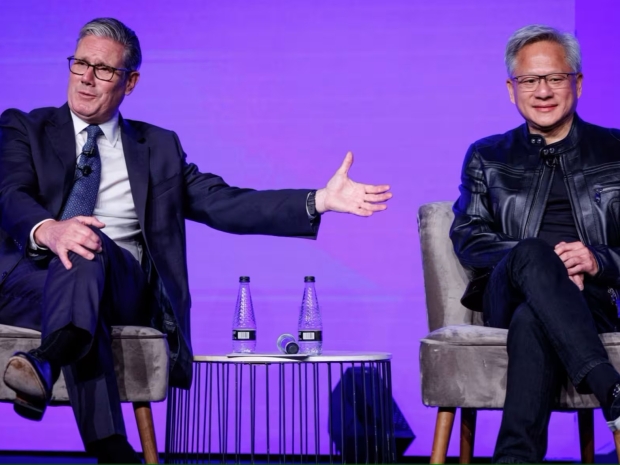Standing next to Prime Minister Keir Starmer, Huang praised the UK's “Goldilocks” mix of top-notch researchers and big private investment, calling the ecosystem “really perfect for take-off... It’s just missing one thing, this is the largest AI ecosystem in the world without its own infrastructure.”
Starmer, trying to keep the wheels from coming off his hype train, pledged another £1 billion to boost computing firepower, promising to scale Britain’s AI muscle by a factor of 20.
The pledge came as AI cloud outfits Nscale and Nebius unveiled plans to build data centres in the UK loaded with Nvidia gear, set to go live later this year.
“We can be an AI maker, not an AI taker,” he said, sounding like he’d spent the morning with a whiteboard and a random bag of slogans.
For Huang it’s all about hedging bets. The chipmaker is leaning into “sovereign AI” contracts, including deals with Saudi Arabia and the UAE, to reduce its reliance on a handful of Big Tech buyers like Microsoft, Amazon and Meta, who still account for most of its data centre revenue.
To look more embedded in Blighty’s tech scene, Nvidia said it would set up a new AI Technology Centre in Bristol to train developers in AI models and robotics. It’s also launching a “UK Sovereign AI Industry Forum” with the likes of BAE Systems, BT and Standard Chartered to push AI adoption locally.
It’s teaming up with the Financial Conduct Authority and fintech start-up NayaOne to build a “digital sandbox” for testing AI in financial services.
Despite the cheerleading, the funding gap is still vast. Last year, UK private AI investment hit $4.5 billion. In the US, it was $109.1 billion. China threw in $9.3 billion. Those numbers come courtesy of Stanford’s 2025 AI Index.
This year’s AI Opportunities Action Plan, cooked up by venture capitalist Matt Clifford, called for the UK to own enough gear to match 100,000 of today’s Nvidia GPUs by 2030. The extra billion is supposed to help expand the UK’s AI Research Resource, a string of supercomputers first floated at the AI Safety Summit in 2023.
The government wants every civil servant to get AI training from the autumn and start figuring out how to do more with less. Cabinet secretary Sir Chris Wormald said it’s part of building a civil service that “takes more calculated risks”, which sounds like a polite way of saying they’ll have fewer people doing more work with machines watching.




